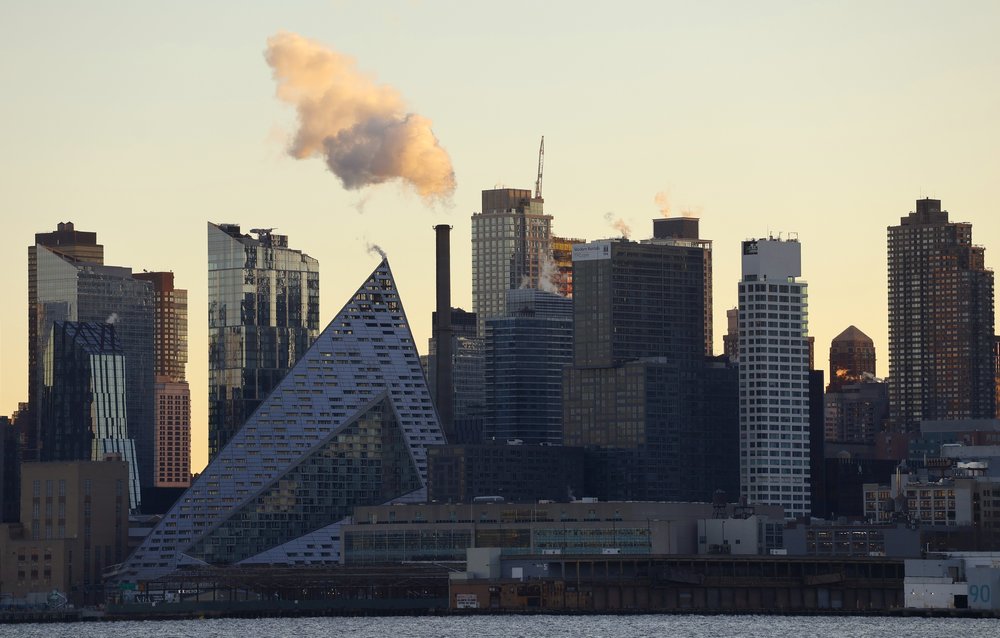NYC buildings department finalizes rules before 2024 climate law goes into effect
Dec. 18, 2023, 9:12 p.m.
Some climate activists are unhappy with the package, saying it includes loopholes for the real estate lobby.

The city Buildings Department on Monday released the finalized rules for the implementation of Local Law 97, considered the city’s most impactful climate law — though some activists argued it created loopholes for landlords.
The law, passed in 2019, aims to reduce the use of natural gas and other fossil fuels in the city’s biggest carbon polluters — buildings over 25,000 square feet — starting in 2024, before stricter limits go into effect by 2030.
Under the rule package, buildings must undergo energy efficiency retrofits and take measures to reduce carbon emissions produced by their operations — or pay penalties if they don’t. Building owners will be required to submit yearly reports on their buildings emissions, with the first one due May 1, 2025. The law is set to affect around 50,000 buildings.
“Our administration is working tirelessly to reduce harmful carbon greenhouse gas emissions from every sector, including buildings — our city’s largest source of emissions,” Mayor Eric Adams said in a statement. “Our ‘Getting 97 Done’ plan and these rules will help buildings go green and save green, and it’s all a part of our overall strategy to build a more sustainable, resilient city so New Yorkers are safer from the effects of climate change in the future.”
The regulations, which go into effect Jan. 1, 2024, haven’t changed much since the proposed rules were released in September alongside Mayor Eric Adams’ “Getting 97 Done” initiative. They give building owners an extra year and half to comply if they create plans that show a “good-faith effort” toward decarbonization.
Some advocates have pushed back against “renewable energy credits,” which they characterized as a way of buying out of compliance, since they allow landlords to avoid fines by investing in renewable energy. In an email, DOB spokesperson Andrew Rudansky told Gothamist the department had rules in place limiting those credits so that property owners can only use them for carbon emissions that are produced off-site. They cannot be used to offset emissions created on-site through an oil or gas boiler, for example, he added.
The DOB also placed a limitation on the number of renewable energy credits for every building owner "that avails themselves to the Decarbonization Plan route in the Good Faith Efforts provision laid on in the law," the spokesperson said.
In written statements supporting the law, environmental groups like Urban Green Council and the New York League of Conservation Voters said the new rules were necessary to make progress in reducing emissions.
“This is one more important step to make our world-leading climate law practical, implementable and real,” said John Mandyck, CEO of Urban Green Council. “The new rules provide clarity with incentives to accelerate carbon savings, especially with the new breakthrough beneficial electrification credit. We applaud DOB for establishing forward-looking and actionable compliance pathways in this rulemaking to achieve the carbon savings that are needed.”
But some local environmental groups have criticized the softened regulations, characterizing them as loopholes for building owners.
In a joint statement on Monday, political advocacy groups Food and Water Watch, New York Communities for Change, NYPIRG and TREEage said the mayor’s rules had jeopardized the benefits of the law by allowing them to continue polluting for longer.
"Under Mayor Adams’ rules for real estate, owners of New York City’s most polluting buildings will opt to delay or entirely avoid pollution reductions, leaving New Yorkers breathing more pollution, losing good jobs, and paying higher utility bills,” the statement read. “We urge the next Mayor and Council to close Adams’ loophole-riddle rules. They have the power to protect our city from the Mayor’s action today, which repays his big donors in the real estate lobby while leaving the rest of us out in the cold.”
This story has been updated with new information on the Department of Buildings' limitations placed on renewable energy credits.
Climate protesters arrested at City Hall rally to oppose weakening of major NYC law Mayor Adams wants to soften enforcement of climate law that aims to reduce building emissions